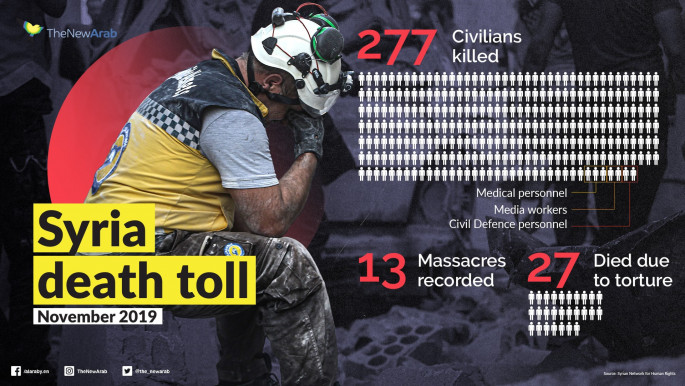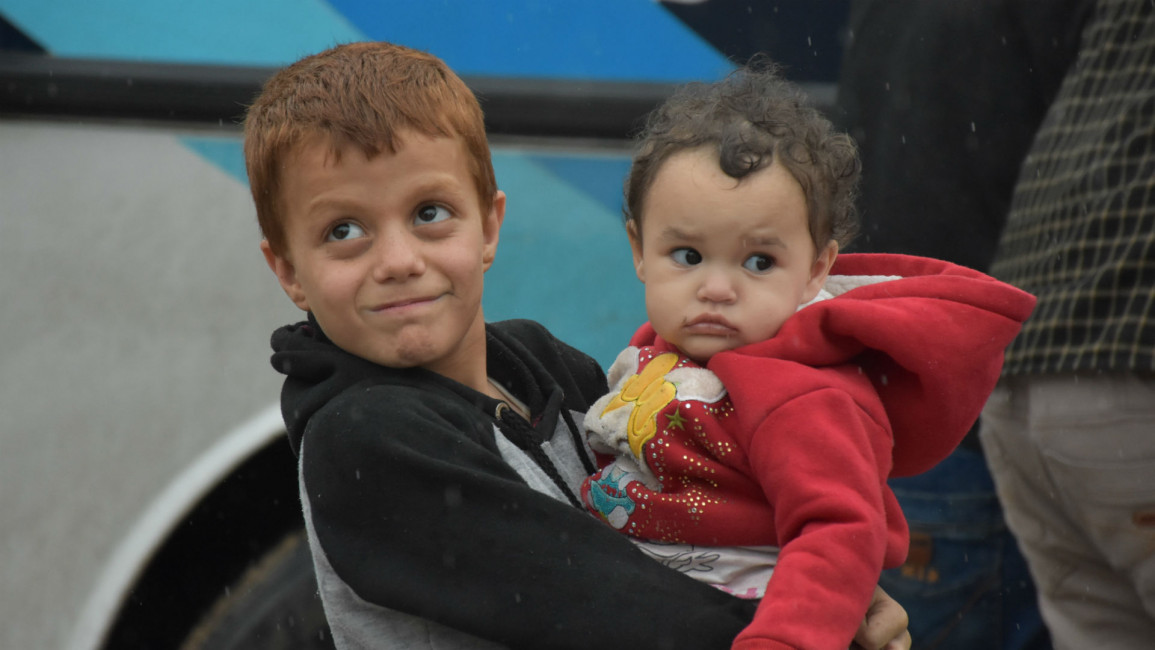Syrian regime detains children at Palestinian camp for allegedly tearing down Assad poster
The Damascus Patrol Branch raided Al-Jarmaq School and arrested 20 students, the Action Group for Palestinians of Syria (AGPS) reported.
The patrol went on to search the houses of civilians, before arresting a further 36 Palestinian children aged between an 10 and 16.
Families and leading officials at Yarmouk, a Palestinian refugee camp in Syria, met with the Patrol Branch in an attempt to secure the release of the children over fears they could be tortured in detention.
Hamza Al-Khatib, a schoolboy, was brutally tortured and murdered in regime detention for allegedly scrawling an slogan against Bashar Al-Assad in the southern Syrian town of Daraa in 2011, sparking widespread anger and escalating anti-regime protests.
Syrian authorities claimed the arrested children were affiliated with a Islamic State group youth affiliate, dubbed the "Cubs of the Caliphate", an accusation the families vehemently deny.
One young boy who was released later on Sunday said the students were interrogated over alleged ties to the "Cubs of the Caliphate", which IS used to recruit and train child soldiers.
"Until now, the fate of those children is still unknown as they remain in the custody of the patrol branch in Damascus," AGPS said.
This isn't the first time the Syrian regime has arrested children. Earlier this year some 50 children in the Homs governorate were arrested after leaflets given out among local residents showed support for the Syrian revolution, Orient News reported.
 |
| Most of Yarmouk is under rubble [Getty] |
Local activists told reporters the children were aged between 13 and 16 years and were detained by intelligence services in raids on their homes and schools in the town of Al-Rastan.
Analysts argue that such arrests are intimidation tactics used by the Syrian regime to punish family members suspected of being sympathetic to the anti-Assad revolution.
Forced disappearances and torture
Forced disappearances, torture and execution are common fates for prisoners in Syria with tens of thousands of detainees believed to have been executed, died under torture, or due to poor conditions in regime jails.
The AGPS documented the death of 616 Palestinian refugees under torture in Syrian regime prisons since the beginning of the war in 2011.
Approximately 1,780 Palestinian refugees are secretly held in prison, with 109 of that number being women and children.
It is likely that the true numbers are much higher, as the regime have been reluctant to release the names of its prisoners.
Amongst them are professionals, including activists, volunteers as well as journalists and academics.
Affidavits by ex-detainees reveal Palestinian refugees have been subjected to harsh psychological and physical torture tactics, including electric shocks, heavy beating using iron sticks, and sexual abuse.
An estimated 98,000 Syrians have also disappeared since the start of the anti-government uprising, with the vast majority detained by the regime, the Syrian Network for Human Rights (SNHR) found.
A report released in September documented the forced disappearance of at least 98,279 people in Syria over the course of the eight-year war.
Read More: Syria Weekly: Syrians remember Soleimani with fear and loathing
The United Nations defines forced disappearance as the arrest, detention or abduction of persons followed by a refusal to disclose their fate or whereabouts or a refusal to acknowledge the deprivation of liberty, which places these persons outside the protection of the law.
 |
The SNHR said that an additional 46,000 people had been detained by all parties in the war.
Following the destruction of most of the Yarmouk refugee camp for Palestinians outside Damascus during a regime offensive, Bashar Al-Assad is asking refugees to return.
"There are countries that still hinder the return of Syrian and Palestinian refugees, despite the Syrian government facilitating their return, and a plan to organise the return of refugees," claimed Faisal al-Miqdad, deputy minister of foreign affairs for the Syrian regime.
“We have officially informed Syria of the return of people to Yarmouk," said a spokesperson for the Popular Front for the Liberation of Palestine, a regime-affiliated militia.
However, many Palestinians are skeptical.
"The regime is trying to cover up its primary role in the destruction of 80 per cent of homes and infrastructure in the camp," Ayman Abu Hisham, general co-ordinator of Fatah told The New Arab.
"The regime is trying to hide responsibility for these crimes by claiming to welcome the return of Palestinian refugees," he went on to say.
"But how do they return to a destroyed camp without any plans for reconstruction? A new decree issued by the Syrian government earlier this year wants to end the area's nature as a Palestinian camp. Those [Palestinian] factions who welcome the regime's announcement are complicit in her crimes."


![President Pezeshkian has denounced Israel's attacks on Lebanon [Getty]](/sites/default/files/styles/image_684x385/public/2173482924.jpeg?h=a5f2f23a&itok=q3evVtko)



 Follow the Middle East's top stories in English at The New Arab on Google News
Follow the Middle East's top stories in English at The New Arab on Google News


